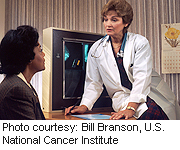
MONDAY, Oct. 25 (HealthDay News) — Colorectal cancer screening among poor minority women could be increased by offering to arrange for the procedure during a mammography visit, a new study suggests.
While colorectal cancer screening is inadequate in minority communities in the United States, many minority women undergo mammograms, said the researchers at the Memorial Sloan-Kettering Cancer Center in New York City.
Between July 2003 and October 2005, the study authors offered colonoscopies to 2,616 women attending the Breast Examination Center of Harlem, a community outreach program serving a primarily black and Hispanic population. The women were at least 50 years old and had no history of colorectal cancer or screening within the last 10 years.
Of the women who were asked, 2,005 (77 percent) refused to take part in the study and 611 (23 percent) were enrolled. However, most of the women who refused were interested in colorectal cancer screening. This shows that offering colorectal cancer screening at the time of mammography is an effective way of generating interest, according to the researchers.
Of the 611 women who were enrolled in the study, 55 percent (337 women) had a colonoscopy and 15 percent of them (49 women) were found to have cancerous polyps, the study found.
The most significant barrier to colorectal cancer screening was lack of insurance, the authors noted.
The study, published online Oct. 25 in the journal Cancer, shows the value of offering colorectal cancer screening during mammography visits, according to the researchers.
“Minority women can be referred, medically screened, and prepared for colonoscopy without seeing a doctor initially; this can be done by nurses and can greatly facilitate colon cancer screening, particularly in underserved communities,” study team leader Dr. Moshe Shike said in a news release from the journal’s publisher.
“The new Health Insurance Bill passed by Congress will likely increase demand for screening, and it is important to find ways to facilitate the process,” he added.
More information
The U.S. National Cancer Institute has more about colorectal cancer screening.

